
Mathematics for Teaching
This site is NOT about making mathematics easy because it isn't. It is about making it make sense because it does.

Levels of Problem Solving Skills

Level 1 – Recognition
Students at this level have the ability to recognize characteristics of a previously solved problem in a new situation and believe that one can do again what one did before. Solvers operating at this level would not be able to anticipate sources of difficulty and would be surprised by complications that might occur as they attempted their solution. A student operating at this level would not be able to mentally run-through a solution method in order to confirm or reject its usefulness.
Level 2 – Re-presentation
Students at this level are able to run through a problem mentally and are able to anticipate potential sources of difficulty and promise. Solvers who operate at this level are more flexible in their thinking and are not only able to recognize similarities between problems, they are also able to notice the differences that might cause them difficulty if they tried to repeat a previously used method of solution. Such solvers could imagine using the methods and could even imagine some of the problems they might encounter but could not take the results as a given. At this level, the subject would be unable to think about potential methods of solution and the anticipated results of such activity.
Level 3 – Structural abstraction
Students at this level evaluates solution prospects based on mental run-throughs of potential methods as well as methods that have been used before. They are able to discern the characteristics that are necessary to solve the problem and are able to evaluate the merits of a solution method based on these characteristics. This level evidences considerable flexibility of thought.
Level 4 – Structural awareness
A solver operating at this level is able to anticipate the results of potential activity without having to complete a mental run-through of the solution activity. The problem structure created by the solver has become an object of reflection. The student is able to consider such structures as objects and is able to make judgments about them without resorting to physically or mentally representing methods of solution.
The levels of problem solving skills described above indicate that as solvers attain the higher levels they become increasingly flexible in their thinking. This framework is from the dissertation of Cifarelli but I read it from the paper The roles of reification and reflective abstraction in the development of abstract thought: Transitions from arithmetic to algebra by Tracy Goodson-Espy. Educational Studies in Mathematics 36: 219–245, 1998. © 1998 Kluwer Academic Publishers. Printed in the Netherlands.
You may also be interested on Levels of understanding of function in equation form based on my own research on understanding function.
Image Credit: vidoons.com/how-it-works
- Click to share on Facebook (Opens in new window)
- Click to share on LinkedIn (Opens in new window)
- Click to share on Twitter (Opens in new window)
- Click to share on Reddit (Opens in new window)
- Click to email a link to a friend (Opens in new window)
View All Posts
One thought on “ Levels of Problem Solving Skills ”
Great! Interesting trial to rank ‘The levels of appreciating, handling, problematics, then methods.’.
Too much weight on ‘methods’ at my sense (because – so often – the main difficulty is not there downstream, but upstream, at the analyse and comparative pace, in the capacity to analyse the datas, their linkage, the system as named in Physics.).
Eventhough this slight remark, THANK YOU, congratulations, and encouragements to continue!
Comments are closed.
5 Levels Of Problem Solving: A Framework For (First-Time) Managers

Leading people can be tough. Taking the reins for the first time? It can feel like navigating a maze blindfolded. Many first-time managers feel that pit in their stomach. Without the right guidance or training, they often turn, unintentionally, into micromanagers. Nobody's dream scenario. But, good news - help's at hand!
A few weeks ago, I interviewed two workplace pioneers for one of our monthly live events (part of the Corporate Rebels Academy ). In this extremely insightful conversation, I had the pleasure of interviewing Edwin Jansen and Luz Iglesias. They both work at Raise (formerly known as Ian Martin Group).
The company employs over 450 people and has offices in the US, Canada, India, Ghana, and the Philippines. It is a certified B Corp and has been reinventing its management practices for about 8 years.
Its business? Recruitment.
Avoid becoming the all-mighty fixer
In 2017, Edwin and Luz took the lead on changing the company's way of working. They started in one of the company's subsidiaries and used it as a test ground for finding a better way to work.
When I asked Edwin, who was the leader of the subsidiary back then, what their biggest challenge was, his answer was clear:
"It was me. I had to change."
Edwin: "At the time, Luz pointed out a significant flaw in my approach: I had become a 'fixer'. To be clear, this wasn't a compliment.
"It highlighted a dangerous trajectory where I had become the go-to person for every problem, failing to empower my team members to think critically and solve issues independently.
"Doing so, I robbed people of the opportunity to learn and grow."
In a self-managing organization, leaders have to let go and give others the opportunity to step up. Edwin was very honest about his shortcomings:
"I simply didn't know how to do that. I had to let people find their own solutions, support them to take more ownership, and stop solving their problems for them."
Edwin and Luz decided to change.
5 levels of problem solving
Along the way, Edwin encountered a framework that helped him become a better leader.
The framework details 5 levels of problem solving - moving from highly dependent to highly independent. The clarity of the various 'levels' of problem solving helped him and his colleagues to create awareness on how they were operating, while also providing clear opportunities for growth (for all involved).
Here's how Edwin explained it:
To summarize, here are the 5 levels Edwin talked about:
- Level 1: The individual doesn't recognize the problem and doesn't know how to solve it.
- Level 2: The individual can identify the problem but doesn't know the solution.
- Level 3: The individual recognizes the problem and has considered multiple solutions, but is unsure which to choose.
- Level 4: The individual identifies the problem, has multiple solutions, and proposes one.
- Level 5: The individual has already encountered a problem, found a solution, and acted on it, and now reports the resolution post-action.
Wanna improve? Here's Edwin's advice:
"At any point, if you're a manager and someone comes to you, whatever level they come to you at, ask them to go one level up.
"And if you're not a manager and you're coming with problems, make sure you're at the highest level that you possibly can be."
Solid (and practical) advice.
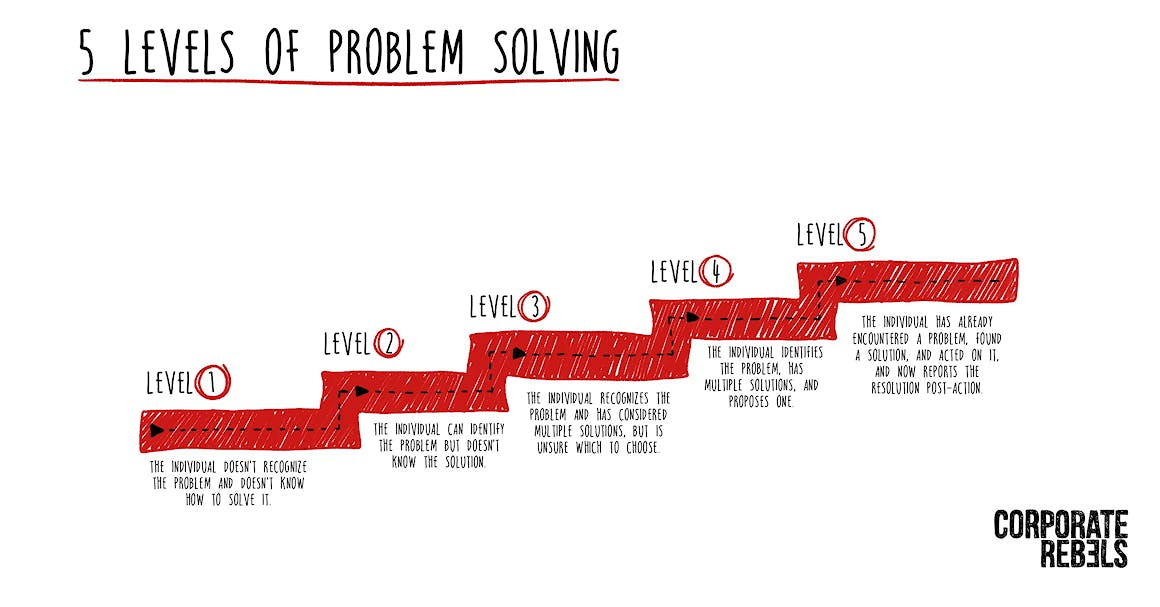
Start decentralizing decision-making now
Decision-making is an art, but with the right framework, it becomes a systematic process that fosters growth and innovation.
The '5 levels of problem solving' is one of those frameworks that has the power to change the way you work immediately. Print it out, share it with your team, and follow Edwin's advice.
Eager for more tips, tools, and frameworks to improve your decision-making? We've got you covered.
With an in-depth course, lots of pioneering practices, and powerful tools, our Academy has everything you need to radically reinvent the way you work.
Start now. Click here .

Download: New Ways Of Working Guide
Unlock our in-depth guide spotlighting trends, tools, and best practices from over 150 pioneering organizations.
No spam. Unsubscribe anytime.

Download: Free Guide
Unlock our in-depth guide on trends, tools, and best practices from over 150 pioneering organizations.
Subscribe below and receive it directly in your inbox.
We respect your privacy. Unsubscribe at any time.
- Virtual Pre-CPSI
- 2024 Virtual Post-CPSI
- 2024 Keynote: Dr. Kiki Ramsey
- Bringing Teams to CPSI
- Schedule and Programs
CPS Level 1: Foundations of Creative Problem Solving
- CPS Level 2: Creative Problem Solving Tools
- CPS Level 3: Creative Problem Solving Facilitation Techniques
- CPS Level 4: Creative Problem Solving Instructor Training
- Sponsors/Partners
- Creative Education Foundation
- What’s Included
CPS Level 1: Foundations of Creative Problem Solving … The Place to Get Started
If you are new to CPSI, Foundations of Creative Problem Solving is your fast track to a deliberate creativity process for solving problems and capitalizing on opportunities. You’ll learn the Creative Problem Solving (CPS) Process , the research-based gold standard of creativity methods, and be exposed to the FourSight framework, which can help you understand how you and your teammates approach challenges.
In an incredibly engaging format, your team of experienced facilitators will use hands-on activities, real-world examples, and a variety of divergent and convergent thinking tools to give you the skills you need to advance your personal and professional goals.
Foundations of Creative Problem Solving is the first of four skills-building courses in Creative Problem Solving . After completing all four CPS courses, you will deepen your ability to facilitate and train others in the CPS process, while also becoming eligible to be considered to lead CPS programs at future CPSIs!
Why Sign Up for CPS Level 1: Foundations of Creative Problem Solving?
In this course, you will:
- Recognize and overcome blocks to creativity.
- Identify attitudes and behaviors conducive to creative thinking.
- Apply core concepts of creative thinking.
- Use a variety of divergent and convergent thinking tools.
- Apply the CPS method to many simulated or real situations.
- Consciously be creative when facing problems and opportunities.
What Previous Participants Have Said About Foundations of Creative Problem Solving:
- Helped break me out of career boredom!
- Teachers were great, practice exercises, principles are easy to understand.
- Springboard provided more than it said it would.
- Exceeded expectations.
- I have some CPS background and still found this absolutely worthwhile.
- Structured process, tips, techniques, variety of exercises, fun + functional.
- I wish I’d taken this years ago.
- It is nice to see how CPS can be used for both personal and professional issues.
- Great to work on my own challenge but also work closely with others. I felt I could make a difference in other’s challenges.

Site Search
Functional maths - problem solving.
Although underpinning knowledge is tested in its own right, problem solving is a core element of Functional Skills mathematics yet should not obscure or add additional mathematical complexity beyond the level of the qualification. Defining problem solving is a challenge but the attributes below are helpful. Not all (in fact often just one) of the listed attributes must be present in a single task for it to be considered to be problem-solving.
- Tasks that have little or no scaffolding: there is little guidance given to the student beyond a start point and a finish point. Questions do not explicitly state the mathematical process(es) required for the solution.
- Tasks that provide for multiple representations, such as use of a sketch or a diagram as well as calculations.
- The information is not given in mathematical form or in mathematical language; or there is a need for the results to be interpreted or methods evaluated, for example, in a real-world context.
- Tasks have a variety of techniques that could be used.
- The solution requires understanding of the processes involved rather than just application of the techniques.
Master Functional Skills Maths books from MarsCademy

A new series of comprehensive Functional Skills Maths books now available from talented mathematician and teacher Marsida Horeshka who you may already know from her popular Functional Skills maths site https://marscademy.com/ (previously known as Maths Made Fun). The three Entry Level books are now available on Amazon (and soon from other booksellers).
Oxford University Press - free FS worksheets to support ‘Maths the Basics’
An incredible collection of free worksheets from OUP. Designed to support the excellent book ‘Maths the Basics’ by June Haighton et al (see our separate entry about this book) but can be used independently. I haven’t looked at them all ( there are more than a 100 - plus answer sheets!) but they seem to cover Entry Level 3 to Level 2. In addition there are many other useful downloads including tips and hints for non-specialists on delivering Functional Skills maths, English and ICT and much more.
Theme Park L1 Functional Skills Maths Project
This is a resource I've designed to be a homework/classwork support for L1 Functional Skills maths (reform).
Editor's notes
A wonderful 104-page compilation of resources covering almost every aspect of Level 1 Reformed Functional Maths. With curriculum mapping and links to further resources. Note this project includes resources from many excellent free web sites - please read the notes on the front cover sheet and page 104 for further information.

- Learn Collaborative Problem Solving »
- Essential Foundation in Collaborative Problem Solving »
Essential Foundation in Collaborative Problem Solving
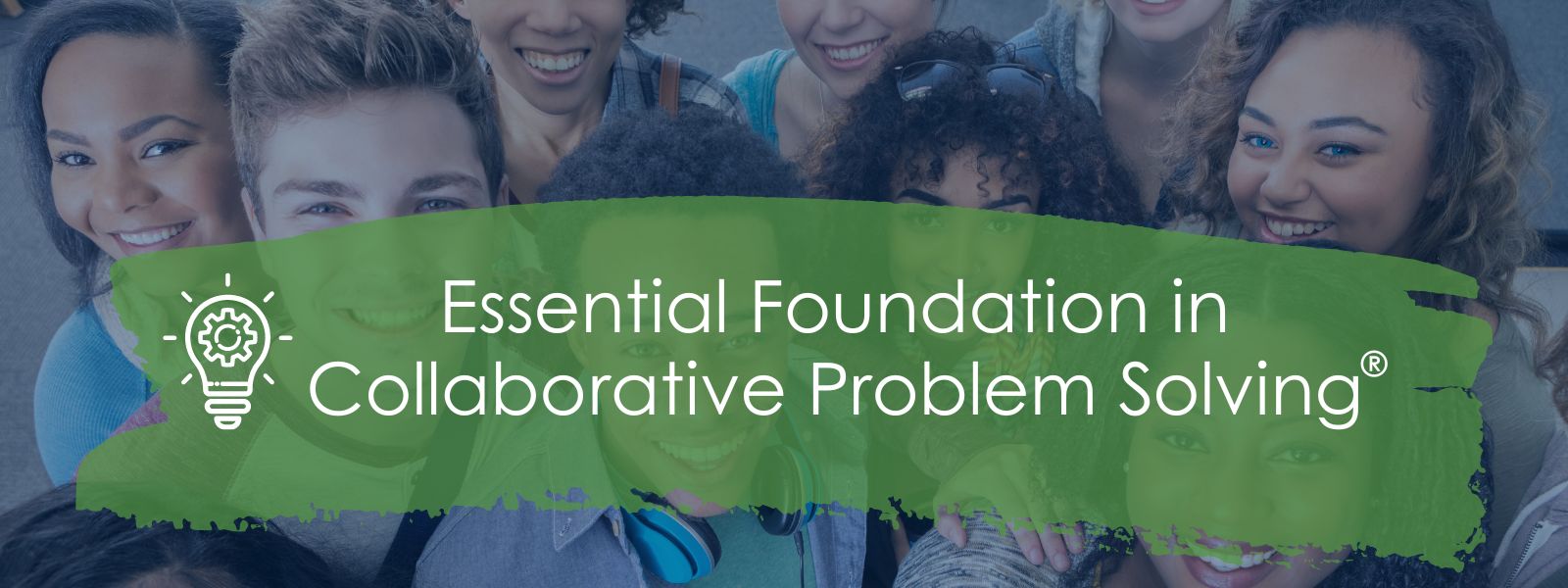
The Essential Foundation in Collaborative Problem Solving (level 1) course covers all aspects of the Collaborative Problem Solving approach. Through lectures, role-play, video examples, case studies, and breakout groups, participants learn how to identify what’s really causing unmet expectations and challenging behavior and how to address those causes using a relational and replicable process. After completing the course, participants are eligible to take Advanced Concepts in Collaborative Problem Solving (level 2).
Upon completion, you will be able to:
- Describe why a new approach is needed for working with individuals with challenging behaviors.
- Explain that a person's behavior is influenced by their thinking skills rather than their motivation to behave well
- Identify how implicit bias may impact judgment about a person's behavior.
- Differentiate between problems to be solved and challenging behaviors when doing a Collaborative Problem Solving Assessment.
- Identify how responses to situations are consistent with Plan A, Plan B, and Plan C.
- Use Collaborative Problem Solving to build skills and address problems, not just challenging behaviors.
- Solve problems collaboratively with others.
Upcoming Sessions
Essential foundation in collaborative problem solving® | oct2024 | ce / pdp, essential foundation in collaborative problem solving®| nov2024 | ce / pdp, essential foundation in collaborative problem solving® | jan2025 | ce / pdp, if the above days and times don't work for you, please submit this form to let us know what would work best for your schedule and we will be in touch when a class meets your schedule needs., additional information, earn ce and pdp credits in public training, think:kids/mgh is an accredited provider of continuing education (ce) credit and professional development points (pdp). this public course offers 12 continuing education credits/professional development points. learn how to get credit >>, who should attend, this beginner-level course is designed for social workers, educators, residential program staff, and mental health clinicians . please contact [email protected] if you are unsure if this course is for you. , policies & important information, financial support: if you require financial support, please apply for assistance by completing this form . funds are limited, and the application does not guarantee an award., registration deadline: registration closes two business days before the start of the course or if we have reached our maximum capacity and the registration is no longer live on the website., cancelation and refund policy >> , grievances and accommodations policy >> , confidentiality of participant information policy >>, attendance and earning ce/pdp policy >> , system requirements: users must join the training on their own devices, have access to a strong internet signal, use a web camera and microphone, and have downloaded zoom to their devices. review the zoom system requirements on their website >>, host a private training, if your organization is interested in hosting a private in-person or online training for your employees, please get in touch with us to learn about our customized training options, what our clients say, privacy overview.
Looks like we don’t currently have an answer to what you are searching for. Our team is working hard to add content on a weekly basis, but in the meantime please reach out directly and we’ll be happy to help.
- 5 Simple Steps to Mathletics
- 4. Extend & Reinforce
1. Problem Solving & Reasoning
Written by Elizabeth Carlson
Updated at March 4th, 2024
- What is Mathletics? Free Mathletics Trial Mathletics Demo Pricing
- 5 Simple Steps to Mathletics 1. Start Here 2. Use Mathletics in your lessons 3. Take Action - Results & Reporting 4. Extend & Reinforce 5. Celebrate Learning
- Mathletics Webinars
- Mathletics Teacher Console Mathletics Teacher Console basics Mathletics Student Management Mathletics Courses Mathletics Assign & Review Mathletics Course Activities Skill Quests Problem Solving and Reasoning (PSR) Assessments Resource Hub Settings Student View Mathletics Teacher Guides
- Mathletics Student Console Mathletics Student Console basics Student Centre Overview Home Reources Games Rewards and Recognition Live Mathletics
- Mathletics Parents/Home User Parents of children who have Mathletics through their school
- Mathletics Administrator Administrator Guides Administrator Printables Rollover School Roll Admin Reports Teacher View
- Mathletics Reporting Reports Results
- Mathletics Rollover Rollover Guides Completing your Mathletics Rollover
- Mathletics Classroom Strategies & Tips Differentiation/Student Groups Blended Learning with Mathletics Student Engagement Mathletics Homework Nurturing a Growth Mindset
- Mathletics Classroom Printables Classroom Printables/Posters
- Mathletics FAQ's
We offer both video and written content options for you to choose from. Watch this video now, or if you prefer, continue reading below.
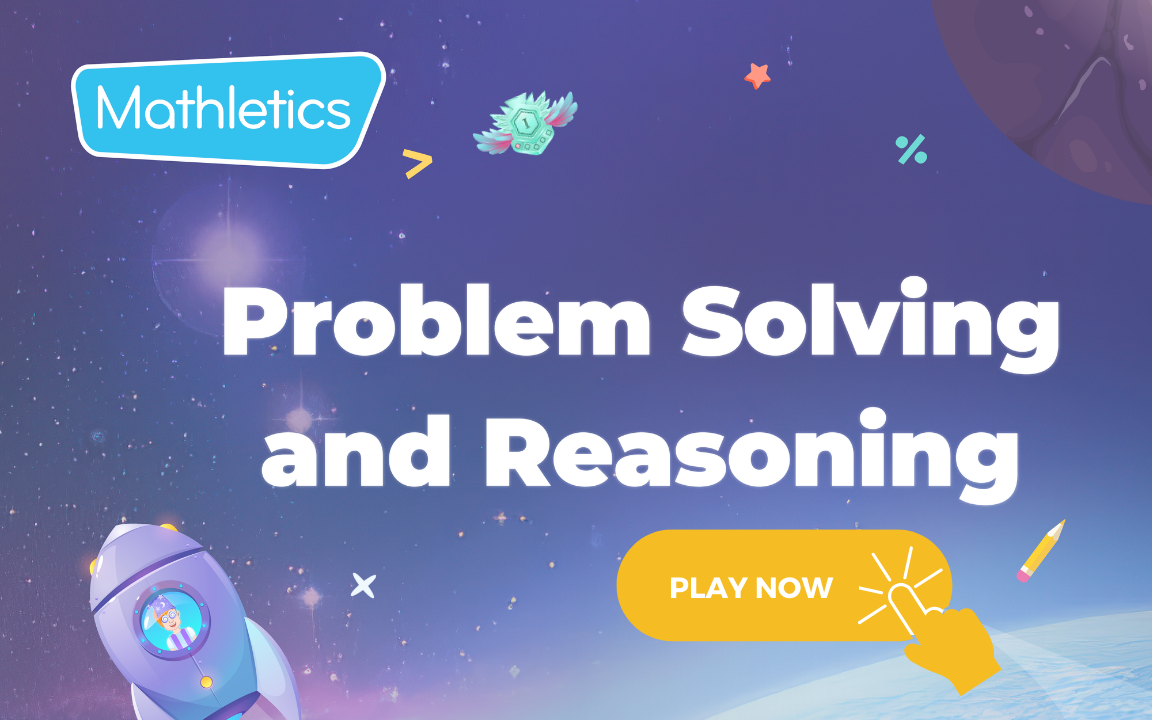
Mathletics contains over 700 Problem Solving & Reasoning challenges. These challenges can be assigned to students and are also ideal to present to the class to develop and model mathematical discussion.
The Problem Solving and Reasoning Challenges are crafted to engage and test students' abilities. We recommend that they be shared on the class screen so that the teacher can discuss with the class about the challenge and model how to answer the problem. The Challenges can also be assigned to the class, groups, or individual students and are ideal to use when students are ready to apply their learning and use their maths skills to solve a problem.
How to view and preview a Problem Solving and Reasoning Challenge:
- From the left-hand menu, select ‘ Resource Hub .’

- Select the ‘ Problem Solving & Reasoning ’ tab. Select the appropriate year group and DOK – Depth of Knowledge.

- Select the appropriate year group and DOK – Depth of Knowledge.

Depth of Knowledge – what does it mean and what shall I choose?
Mathletics problem-solving and reasoning content uses Norman Webb’s Depth-of-Knowledge (DOK) levels to indicate the depth of knowledge of each task. There are no DOK Level 1 tasks in problem-solving and reasoning.
DOK Level 1 (Recall)
requires the recall of information such as facts, definitions, rules or recall of simple procedures such as algorithms or formulas
DOK Level 2 (Skill/Concept)
requires thinking beyond a habitual response; students will need to make decisions as to how to approach the problem or activity
DOK Level 3 (Strategic Thinking)
requires planning, using evidence, explanation and a higher level of decision-making and reasoning to approach a non-routine task
DOK Level 4 (Extended Thinking)
requires investigative skills; students make connections between related concepts and ideas as they explore, experiment and provide evidence for their solutions.
Select the appropriate mathematical strand and sub-strand to view all the Problem Solving and Reasoning challenges that meet your search criteria.
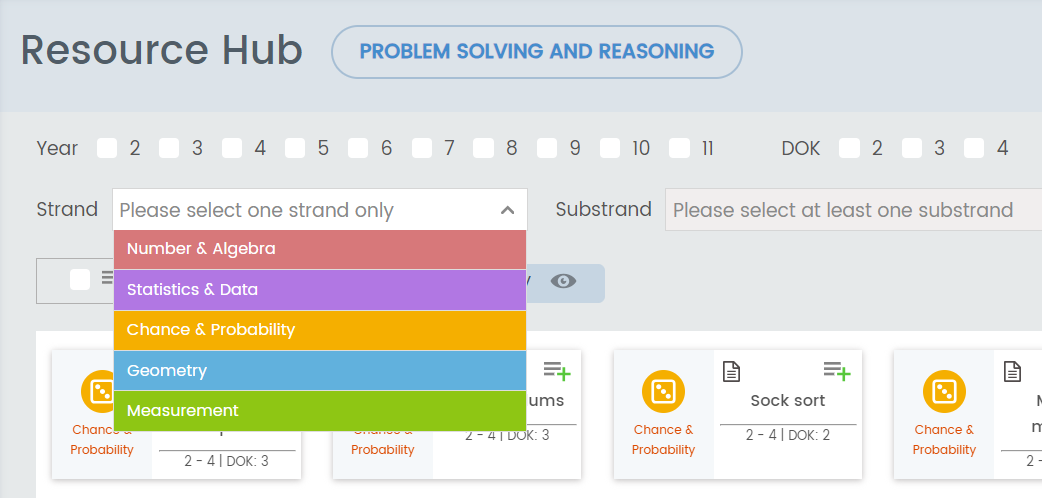
Click on the tile to see more information about the Problem Solving and Reasoning Challenge and to access the teacher notes, preview the challenge or assign it.
TIP – If you want to assign – make a note of the name of the Problem Solving and Reasoning Challenge that you have selected before clicking on the ‘Assign to’ tab.
Teacher Notes – The teacher Notes provide teachers with detailed information about the task, including the solution, common misconceptions, strategic questions, and teaching hints. Preview – Opens the Challenge on your screen – ideal for using in class to encourage and model mathematical discussions and how to complete a Challenge.
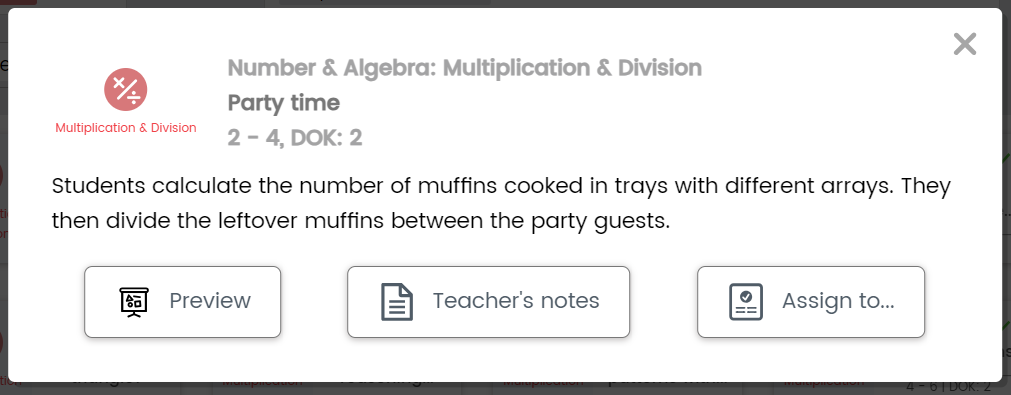
Click on the green + or tick at the top right-hand corner of the Problem Solving and Reasoning tab to open the pop-out to add the challenge to a ‘Playlist.’
Playlists – Playlists help you to organise Problem Solving and Reasoning tasks into collections of challenges. For example, you can create a collection of challenges for a particular maths topic, or for a group of students. Using Playlists makes assigning Challenges easier.
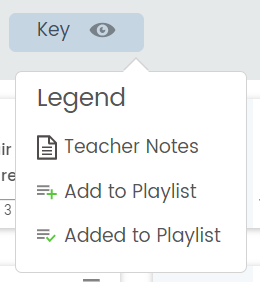
Clicking on ‘Assign to’ takes you through to the ‘Assign and Review, Problem Solving & Reasoning area.’ In this area, you are going to need to select the challenge again.
How to Assign Problem-Solving and Reasoning Challenges
- Select Assign and Review from the left-hand menu

3. Select the appropriate class, whole class or group, then select the Level. In most cases, select the Level that is equivalent to the Year Group of your students. If you want to assign or share in class a slightly easier Challenge, select a lower level.)
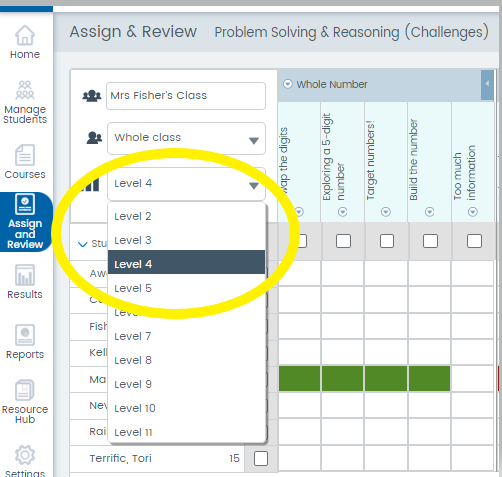
4. Select the Activity Filter from the top menu. From the Strand drop-down, select the mathematical strand. In the Depth of Knowledge drop down select the appropriate level. (See above for an explanation of the different DOK levels.)
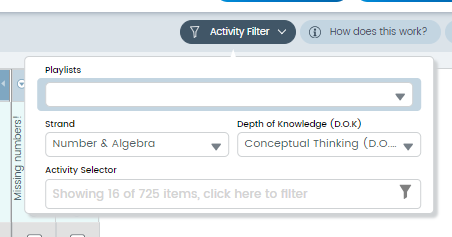
5. To view the details of a Challenge, click the small triangle. From the pop-out, you can view the teacher's notes, preview the activity or assign the challenge to all the visible students. If you wish to assign to only a few students, click ‘Select’ and unhighlight the students that you do not wish to assign to.
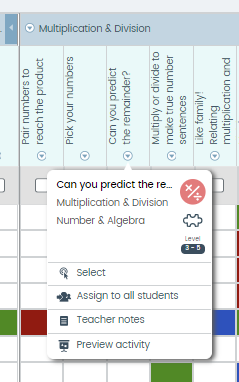
5. To view the details of a Challenge, click the small triangle. From the pop, you can view the teacher's notes, preview the activity or assign the challenge to all the visible students. If you wish to assign to only a few students, click ‘Select’ and unhighlight the students that you do not wish to assign to.
6. When students have been selected, click ‘Assign’ at the bottom of the screen. Challenges are immediately assigned to students on their To-do list.
7. To ensure that students complete the Challenge before exploring other areas on Mathletics and completing work independently, set the Student Lock to show Students on Task.
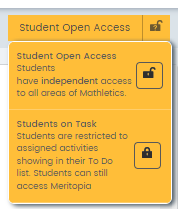
What does it look like in the student console when a Challenge has been assigned?
In student console, you can see the student has been assigned one Challenge. The Challenge is presented in the student's To-do list. As the student lock is on, the student must complete the Challenge before getting access to the other areas of Mathletics.
If the Challenge is assigned and the student lock is not on, then the student will see the Challenge in their To-do list, but they can still access all other areas of Mathletics.
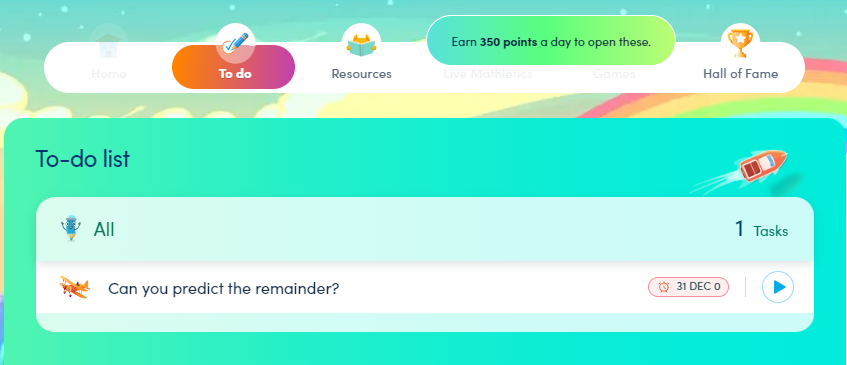
NEXT UP Live Matheltics
Related Articles
- 5. Assign curriculum content & review results
- 6. Times tables - Multiverse
- 2. Live Mathletics
- 4. Math/s A-Z
JavaScript seems to be disabled in your browser. For the best experience on our site, be sure to turn on Javascript in your browser.
- Order Tracking
- Create an Account

200+ Award-Winning Educational Textbooks, Activity Books, & Printable eBooks!
- Compare Products
Reading, Writing, Math, Science, Social Studies
- Search by Book Series
- Algebra I & II Gr. 7-12+
- Algebra Magic Tricks Gr. 2-12+
- Algebra Word Problems Gr. 7-12+
- Balance Benders Gr. 2-12+
- Balance Math & More! Gr. 2-12+
- Basics of Critical Thinking Gr. 4-7
- Brain Stretchers Gr. 5-12+
- Building Thinking Skills Gr. Toddler-12+
- Building Writing Skills Gr. 3-7
- Bundles - Critical Thinking Gr. PreK-9
- Bundles - Language Arts Gr. K-8
- Bundles - Mathematics Gr. PreK-9
- Bundles - Multi-Subject Curriculum Gr. PreK-12+
- Bundles - Test Prep Gr. Toddler-12+
- Can You Find Me? Gr. PreK-1
- Complete the Picture Math Gr. 1-3
- Cornell Critical Thinking Tests Gr. 5-12+
- Cranium Crackers Gr. 3-12+
- Creative Problem Solving Gr. PreK-2
- Critical Thinking Activities to Improve Writing Gr. 4-12+
- Critical Thinking Coloring Gr. PreK-2
- Critical Thinking Detective Gr. 3-12+
- Critical Thinking Tests Gr. PreK-6
- Critical Thinking for Reading Comprehension Gr. 1-5
- Critical Thinking in United States History Gr. 6-12+
- CrossNumber Math Puzzles Gr. 4-10
- Crypt-O-Words Gr. 2-7
- Crypto Mind Benders Gr. 3-12+
- Daily Mind Builders Gr. 5-12+
- Dare to Compare Math Gr. 2-7
- Developing Critical Thinking through Science Gr. 1-8
- Dr. DooRiddles Gr. PreK-12+
- Dr. Funster's Gr. 2-12+
- Editor in Chief Gr. 2-12+
- Fun-Time Phonics! Gr. PreK-2
- Half 'n Half Animals Gr. K-4
- Hands-On Thinking Skills Gr. K-1
- Inference Jones Gr. 1-6
- James Madison Gr. 10-12+
- Jumbles Gr. 3-5
- Language Mechanic Gr. 4-7
- Language Smarts Gr. 1-4
- Mastering Logic & Math Problem Solving Gr. 6-9
- Math Analogies Gr. K-9
- Math Detective Gr. 3-8
- Math Games Gr. 3-8
- Math Mind Benders Gr. 5-12+
- Math Ties Gr. 4-8
- Math Word Problems Gr. 4-10
- Mathematical Reasoning Gr. Toddler-11
- Middle School Science Gr. 6-8
- Mind Benders Gr. PreK-12+
- Mind Building Math Gr. K-1
- Mind Building Reading Gr. K-1
- Novel Thinking Gr. 3-6
- OLSAT® Test Prep Gr. PreK-K
- Organizing Thinking Gr. 2-8
- Pattern Explorer Gr. 3-9
- Practical Critical Thinking Gr. 8-12+
- Punctuation Puzzler Gr. 3-8
- Reading Detective Gr. 3-12+
- Red Herring Mysteries Gr. 4-12+
- Red Herrings Science Mysteries Gr. 4-9
- Science Detective Gr. 3-6
- Science Mind Benders Gr. PreK-3
- Science Vocabulary Crossword Puzzles Gr. 4-6
- Sciencewise Gr. 4-12+
- Scratch Your Brain Gr. 2-12+
- Senior Brain Health Program Gr. 4-8
- Sentence Diagramming Gr. 3-12+
- Smarty Pants Puzzles Gr. 3-12+
- Snailopolis Gr. K-4
- Something's Fishy at Lake Iwannafisha Gr. 5-9
- Teaching Technology Gr. 3-12+
- Tell Me a Story Gr. PreK-1
- Think Analogies Gr. 3-12+
- Think and Write Gr. 3-8
- Think-A-Grams Gr. 4-12+
- Thinking About Time Gr. 3-6
- Thinking Connections Gr. 4-12+
- Thinking Directionally Gr. 2-6
- Thinking Skills & Key Concepts Gr. PreK-2
- Thinking Skills for Tests Gr. PreK-5
- U.S. History Detective Gr. 8-12+
- Understanding Fractions Gr. 2-6
- Visual Perceptual Skill Building Gr. PreK-3
- Vocabulary Riddles Gr. 4-8
- Vocabulary Smarts Gr. 2-5
- Vocabulary Virtuoso Gr. 2-12+
- What Would You Do? Gr. 2-12+
- Who Is This Kid? Colleges Want to Know! Gr. 9-12+
- Word Explorer Gr. 4-8
- Word Roots Gr. 3-12+
- World History Detective Gr. 6-12+
- Writing Detective Gr. 3-6
- You Decide! Gr. 6-12+

Creative Problem Solving Level 1
Grades: PreK-2
Critical Thinking

- Paperback Book - $21.99
- eBook - $21.99
- 12201PBP - Reproducible - Paperback Book $21.99
- 12261PEP - Printable - eBook $21.99
Description and Features
Product details, general license - download.
SOFTWARE LICENSE AGREEMENT
IMPORTANT-READ CAREFULLY
This is a legal agreement between you (a single entity, company, or educational institution) and The Critical Thinking Co.™ for the software accompanying this agreement, which includes computer Software and associated Documentation. By installing this Software on a computer, you agree to be bound by the terms of this agreement. If you do not agree to the terms of this agreement, promptly erase all copies of the software in your possession and return any Software packaging associated with this order within sixty (60) days of purchase to the place from which you obtained it for a full refund.
The Critical Thinking Co.™ hereby grants to you a non-exclusive license to use the software product identified above (the "Software") and the accompanying printed materials and User Manual (the "Documentation") on the terms set forth below.
1. GRANT OF LICENSE. The Critical Thinking Co.™ grants you the right to install and use this Software Product, provided that this software will be installed only in the quantity and for the computer system(s) indicated at the time of your order for the Software.
2. COPYRIGHT. The Software Product and Documentation are protected by copyright laws and international copyright treaties as well as other intellectual property laws and treaties. Therefore, you must treat the Software Product like any other copyrighted material. You may not remove, modify, or alter any of The Critical Thinking Co.'s™ copyright or trademark notices from any part originally contained in or otherwise created by the Software Product, including any notices contained in the Documentation.
3. RESTRICTIONS. You may not modify, translate, reverse engineer, decompile, disassemble, or create derivative works based on the Software, or any portion thereof. The Software Product is licensed as a single product. This Software Product can be installed on a computer as a whole and shall not be separated in parts or disassembled to parts or pieces. You may not rent, lease, or lend the Software or Documentation to any other party without the written permission of The Critical Thinking Co.™. The License is in effect until terminated. The License will terminate automatically if you fail to comply with the limitations described herein. On termination, you must destroy all copies of the Software and Documentation.
4. WARRANTIES. The Critical Thinking Co.™ expressly disclaims any warranty for the Software Product. The Software and Documentation is provided "as is" without warranty of any kind, either expressed or implied, including, without limitation, the implied warranties or merchantability, fitness for a particular purpose, or non-infringement. The entire risk arising out of use or performance of the Software remains with you. If media within this package is defective, remove the software application from your device(s) and return any software packaging associated with this order to The Critical Thinking Co.™ within 60 days of the date of purchase, and they will replace it at no charge.
5. NO LIABILITY FOR CONSEQUENTIAL DAMAGES. In no event shall The Critical Thinking Co.™ or its suppliers be liable for any damages whatsoever (including, without limitation, damages for loss of business profits, business interruption, loss of business information, or any other pecuniary loss) arising out of the use of or inability to use this Software Product, even if The Critical Thinking Co.™ has been advised of the possibility of such damages. Because some states/jurisdictions do not allow the exclusion or limitation of liability for consequential or incidental damages, the above limitation may not apply to you.
6. MISCELLANEOUS. This Agreement represents the complete agreement concerning this license between the parties and supersedes all prior agreements and representations between them. This Agreement may be amended only in writing executed by both parties. The acceptance of any purchase order placed by you is expressly made conditional on your assent to the terms set forth herein, and not those contained within your purchase order. If any provision of this Agreement is held to be unenforceable for any reason, such provision shall be reformed only to the extend necessary to make it enforceable and the remainder of this Agreement shall nonetheless remain in full force and effect. If you acquired this product in the United States, the laws of the State of California govern this Agreement. If this product was acquired outside the United States, then local laws may apply. Should you have any questions concerning this Agreement, or if you desire to contact The Critical Thinking Co.™ for any reason, please write to The Critical Thinking Co.™, PO Box 1610, Seaside, CA 93950-1610, USA; send a fax to 831-393-3277; send email to [email protected]; call 800-458-4849; or refer to The Critical Thinking Co.™'s Website at http://www.criticalthinking.com/ .
Bundle Content
Customer reviews, other products in the same series view product series page.
- Add to Cart Add to Cart Remove This Item
- Special of the Month
- Sign Up for our Best Offers
- Bundles = Greatest Savings!
- Sign Up for Free Puzzles
- Sign Up for Free Activities
- Toddler (Ages 0-3)
- PreK (Ages 3-5)
- Kindergarten (Ages 5-6)
- 1st Grade (Ages 6-7)
- 2nd Grade (Ages 7-8)
- 3rd Grade (Ages 8-9)
- 4th Grade (Ages 9-10)
- 5th Grade (Ages 10-11)
- 6th Grade (Ages 11-12)
- 7th Grade (Ages 12-13)
- 8th Grade (Ages 13-14)
- 9th Grade (Ages 14-15)
- 10th Grade (Ages 15-16)
- 11th Grade (Ages 16-17)
- 12th Grade (Ages 17-18)
- 12th+ Grade (Ages 18+)
- Test Prep Directory
- Test Prep Bundles
- Test Prep Guides
- Preschool Academics
- Store Locator
- Submit Feedback/Request
- Sales Alerts Sign-Up
- Technical Support
- Mission & History
- Articles & Advice
- Testimonials
- Our Guarantee
- New Products
- Free Activities
- Libros en Español
- International
- Education Jobs
- Schools directory
- Resources Education Jobs Schools directory News Search

Level 1 Problem Solving
Subject: Mathematics
Age range: Age not applicable
Resource type: Unit of work
Last updated
26 August 2023
- Share through email
- Share through twitter
- Share through linkedin
- Share through facebook
- Share through pinterest

This is an introduction to Problem Solving for teenagers and adults with special educational needs. It is a full course and includes student worksheets and teaching slides.
The resource is intended to introduce students to concepts of problem solving , including:
- Sorting information, e.g. colours, shapes, direction, design, type, size and shadows
- Patterns and sequence
- Numbers, e.g. recognition of numbers 1 to 10, writing numbers and counting
- Basic addition and subtraction to 10
- Making choices, e.g. choosing appropriate clothes, recognising signs, healthy eating and going out
- Using problem-solving concepts, e.g. grouping, matching, size, round and square, more and less than, odd one out, differences, ordering tasks, left and right, top and bottom, position words, cost, etc.
- Following instructions
These worksheets are designed to cover the following learning outcomes: (1) Organise information in an everyday problem. (2) Identify choices and results in a problem. (3) Solve a problem with support.
Topics include:
- Food and drink
Can this resource be used online? Yes, it is a digital resource. However, it is not currently fillable online. This resource is designed to be used in person. If you have purchased this resource and would like to use it for online teaching, you have permission to do so. These worksheets are best printed, although teachers can use also them for whole-class teaching using a projector or interactive whiteboard.
What is included? All components are available in the zipped folder, i.e. student worksheets and teaching slides. Student Worksheets: 204 Pages Teaching Slides: 122
Tes paid licence How can I reuse this?
Your rating is required to reflect your happiness.
It's good to leave some feedback.
Something went wrong, please try again later.
This resource hasn't been reviewed yet
To ensure quality for our reviews, only customers who have purchased this resource can review it
Report this resource to let us know if it violates our terms and conditions. Our customer service team will review your report and will be in touch.
Not quite what you were looking for? Search by keyword to find the right resource:
AoPS Academy is updating our homepages. Stay tuned for a new look!
Need more information about an AoPS Academy course?
Ask AoPS Academy!
AoPS Academy Contests
A variety of contests are available to AoPS Academy students.
View More Details
Math Level 1
Academic year mathematics.
Students develop their number sense and begin to learn about place value. They are introduced to addition and subtraction and are encouraged to approach numerical problems in clever ways. Additionally, they manipulate shapes, compare numbers, and examine ways to measure physical objects. We use puzzles and games to build skills and establish student understanding of mathematical concepts and problem solving.
Homework and exams
Students should expect to spend 1-3 hours on homework every week. Homework will be assigned and completed through Beast Academy Online , where students receive immediate feedback on their work. Students will take four in-class exams throughout the course.
Students will be given a new textbook each quarter. The textbooks for the course are Beast Academy 1A , 1B , 1C , and 1D .
Textbooks and Beast Academy Online access are included in the tuition and fees of this course.
Virtual Campus Schedule
Fremont, CA Campus Schedule
Irvine, CA Campus Schedule
Mountain View, CA Campus Schedule
Pleasanton, CA Campus Schedule
San Diego, CA Campus Schedule
Santa Clara, CA Campus Schedule
Lexington, MA Campus Schedule
Gaithersburg, MD Campus Schedule
Morrisville, NC Campus Schedule
Princeton, NJ Campus Schedule
Millburn, NJ Campus Schedule
Frisco, TX Campus Schedule
Vienna, VA Campus Schedule
Bellevue, WA Campus Schedule
Redmond, WA Campus Schedule
Virtual Campus
Massachusetts, north carolina.
Our family regularly talks about AoPS. We try to think about how our life would be different without you all. What if my daughter hadn't learned to love math? What if she never experienced being pushed to her limits? Overcoming failure? She wouldn't be who she is. And she is AWESOME! A very proud mom here. We are so fortunate that we found AoPS Academy. I credit AoPS for much of her confidence.
AoPS Academy parent to 16-year-old engineering major at UW and future cancer researcher
Instructor To Be Announced
We have not yet announced an instructor for this class, but we are working on it! It can take time to match all of our classes to our instructors' daily schedules. However, all AoPS instructors are exceptional educators, and each section of this course will cover the same basic material. Students can confidently enroll in this class and expect that one of our outstanding instructors will be assigned soon.
Ask AoPS Academy
I have a question about:
Your information will be used in accordance with our Privacy Policy .

Become a Problem-solving School

Or search by topic
Number and algebra.
- Place value and the number system
- Fractions, decimals, percentages, ratio and proportion
- Calculations and numerical methods
- Algebraic expressions, equations and formulae
- Coordinates, functions and graphs
- Patterns, sequences and structure
- Properties of numbers
Geometry and measure
- 3D geometry, shape and space
- Transformations and constructions
- Vectors and matrices
- Measuring and calculating with units
- Pythagoras and trigonometry
- Angles, polygons, and geometrical proof
Probability and statistics
- Handling, processing and representing data
- Probability
Working mathematically
- Thinking mathematically
- Mathematical mindsets
Advanced mathematics
- Decision mathematics and combinatorics
- Advanced probability and statistics
For younger learners
- Early years foundation stage
Problem Solving
Problem solving and the new curriculum
Developing a classroom culture that supports a problem-solving approach to mathematics
Developing excellence in problem solving with young learners
Using NRICH Tasks to Develop Key Problem-solving Skills
Trial and Improvement at KS1
Trial and Improvement at KS2
Working Systematically - Primary teachers
Number Patterns
Working Backwards at KS1
Working Backwards at KS2
Visualising at KS1 - Primary teachers
Visualising at KS2 - Primary teachers
Conjecturing and Generalising at KS1 - Primary teachers
Conjecturing and Generalising at KS2 - Primary teachers
Mathematical Problem Solving in the Early Years
Low threshold high ceiling - an introduction.
What's all the talking about?
Group-worthy tasks and their potential to support children to develop independent problem-solving skills
Developing the classroom culture: using the Dotty Six Activity as a springboard for investigation

- Children's Books
- Activities, Crafts & Games

Enjoy fast, free delivery, exclusive deals, and award-winning movies & TV shows with Prime Try Prime and start saving today with fast, free delivery
Amazon Prime includes:
Fast, FREE Delivery is available to Prime members. To join, select "Try Amazon Prime and start saving today with Fast, FREE Delivery" below the Add to Cart button.
- Cardmembers earn 5% Back at Amazon.com with a Prime Credit Card.
- Unlimited Free Two-Day Delivery
- Streaming of thousands of movies and TV shows with limited ads on Prime Video.
- A Kindle book to borrow for free each month - with no due dates
- Listen to over 2 million songs and hundreds of playlists
- Unlimited photo storage with anywhere access
Important: Your credit card will NOT be charged when you start your free trial or if you cancel during the trial period. If you're happy with Amazon Prime, do nothing. At the end of the free trial, your membership will automatically upgrade to a monthly membership.
Return this item for free
We offer easy, convenient returns with at least one free return option: no shipping charges. All returns must comply with our returns policy.
- Go to your orders and start the return
- Select your preferred free shipping option
- Drop off and leave!

Download the free Kindle app and start reading Kindle books instantly on your smartphone, tablet, or computer - no Kindle device required .
Read instantly on your browser with Kindle for Web.
Using your mobile phone camera - scan the code below and download the Kindle app.

Image Unavailable

- To view this video download Flash Player

Follow the author

Never Lose Anything Ever Again: Problem-Solving Level 1: 5S Paperback – May 30, 2022
Purchase options and add-ons.
The ‘Problem Solving with Rudy and Corbett’ series is designed to inspire children and families to become problem solvers. In ‘Never Lose Anything Ever Again’, 5S is introduced as a Level 1 problem-solving skill. Rudy has trouble finding things in his room. It gets so bad, he misses his baseball game. Thankfully, Corbett knows 5 steps that will help him never lose anything ever again!
- Print length 31 pages
- Language English
- Publication date May 30, 2022
- Dimensions 8.25 x 0.08 x 8.25 inches
- ISBN-13 979-8819497470
- See all details

Customers who bought this item also bought

Product details
- ASIN : B0B2QGFMJZ
- Publisher : Independently published (May 30, 2022)
- Language : English
- Paperback : 31 pages
- ISBN-13 : 979-8819497470
- Item Weight : 2.89 ounces
- Dimensions : 8.25 x 0.08 x 8.25 inches
- #6,264 in Children's Interactive Adventures
- #52,549 in Education Theory (Books)
About the author
Mabel shelton.
Mabel is a certified Lean Six Sigma Master Black Belt, located in Nashville, TN. Her advanced problem-solving skills have served Corporate America for over a decade in the Aviation, Healthcare, and Customer Service industries. During that time, she also trained more than 1,000 employees in Lean Six Sigma methodologies at the Yellow, Green, and Black Belt levels.
At the start of 2021, Mabel felt compelled to start Fifth Sierra Consulting to expand her scope of influence. Her belief is that all people (even children!) can use LSS to make their daily lives easier.
Customer reviews
- 5 star 4 star 3 star 2 star 1 star 5 star 100% 0% 0% 0% 0% 100%
- 5 star 4 star 3 star 2 star 1 star 4 star 100% 0% 0% 0% 0% 0%
- 5 star 4 star 3 star 2 star 1 star 3 star 100% 0% 0% 0% 0% 0%
- 5 star 4 star 3 star 2 star 1 star 2 star 100% 0% 0% 0% 0% 0%
- 5 star 4 star 3 star 2 star 1 star 1 star 100% 0% 0% 0% 0% 0%
Customer Reviews, including Product Star Ratings help customers to learn more about the product and decide whether it is the right product for them.
To calculate the overall star rating and percentage breakdown by star, we don’t use a simple average. Instead, our system considers things like how recent a review is and if the reviewer bought the item on Amazon. It also analyzed reviews to verify trustworthiness.
- Sort reviews by Top reviews Most recent Top reviews
Top reviews from the United States
There was a problem filtering reviews right now. please try again later..
- Amazon Newsletter
- About Amazon
- Accessibility
- Sustainability
- Press Center
- Investor Relations
- Amazon Devices
- Amazon Science
- Sell on Amazon
- Sell apps on Amazon
- Supply to Amazon
- Protect & Build Your Brand
- Become an Affiliate
- Become a Delivery Driver
- Start a Package Delivery Business
- Advertise Your Products
- Self-Publish with Us
- Become an Amazon Hub Partner
- › See More Ways to Make Money
- Amazon Visa
- Amazon Store Card
- Amazon Secured Card
- Amazon Business Card
- Shop with Points
- Credit Card Marketplace
- Reload Your Balance
- Amazon Currency Converter
- Your Account
- Your Orders
- Shipping Rates & Policies
- Amazon Prime
- Returns & Replacements
- Manage Your Content and Devices
- Recalls and Product Safety Alerts
- Registry & Gift List
- Conditions of Use
- Privacy Notice
- Consumer Health Data Privacy Disclosure
- Your Ads Privacy Choices

COMMENTS
Problems Solving Level One. Codewars 8 Kyu. Video Number 1 04:18. Playlist Introduction And Important Instructions. C++ Watch Video. Video Number 2 08:34. Simple Multiplication; Century From Year; Is N Divisible By X And Y? C++ Watch Video. Video Number 3 05:50.
Level 1 Math Games Game Spotlight: Skateboard Pups ... Turtle Rounding. Shape Names. Time. Money Operations and Algebraic Thinking Addition Chart. Math Word Problems. Thinking Blocks Jr. Bridge Builder. Galaxy Pals 20. Superhero Subtraction. Skateboard Pups. ... Logic and Problem Solving Games Two Friends. Paint the House Blue. Number Path ...
Level 1 - Recognition. Students at this level have the ability to recognize characteristics of a previously solved problem in a new situation and believe that one can do again what one did before. Solvers operating at this level would not be able to anticipate sources of difficulty and would be surprised by complications that might occur as ...
To summarize, here are the 5 levels Edwin talked about: Level 1: The individual doesn't recognize the problem and doesn't know how to solve it. Level 2: The individual can identify the problem but doesn't know the solution. Level 3: The individual recognizes the problem and has considered multiple solutions, but is unsure which to choose. Level 4: The individual identifies the problem, has ...
Our Level 1 curriculum includes four books, one for each unit (1A, 1B, 1C, 1D). These books include Guide sections written in an engaging comic book style, and over 400 practice problems ranging from introductory level exercises to very challenging puzzles and word problems. ... Level 1D Problem Solving p. 184-187. I'm pretty sure they are the ...
The Art of Problem Solving, Volume 1, is the classic problem solving textbook used by many successful MATHCOUNTS programs, and has been an important building block for students who, like the authors, performed well enough on the American Mathematics Contest series to qualify for the Math Olympiad Summer Program which trains students for the United States International Math Olympiad team.
This marvelously engaging workbook spurs creative problem-solving through an abundance of richly-imagined challenges that stimulate youngsters to think in new and different ways! Creative Problem Solving Level 1's powerful efficacy is due, in part, to its enormous entertainment value. The problems to be explored and solved play more like fun ...
Why Sign Up for CPS Level 1: Foundations of Creative Problem Solving? In this course, you will: Recognize and overcome blocks to creativity. Identify attitudes and behaviors conducive to creative thinking. Apply core concepts of creative thinking. Use a variety of divergent and convergent thinking tools. Apply the CPS method to many simulated ...
Functional Maths - problem solving. Although underpinning knowledge is tested in its own right, problem solving is a core element of Functional Skills mathematics yet should not obscure or add additional mathematical complexity beyond the level of the qualification. Defining problem solving is a challenge but the attributes below are helpful.
Problems From Beginner (Level 1) Problem Solving 1. The number 2:5252525::: can be written as a fraction. When reduced to lowest terms, what is the sum of the numerator and denominator of this fraction? 2. How many three-digit numbers are there with only even digits? 3. For two particular prime numbers, their sum and di erence are also prime ...
Video 01 - IntroductionProblems Page:https://elzero.org/problems-solving-level-one/Fundamentals of Programming With C++ https://www.youtube.com/playlist?lis...
The Essential Foundation in Collaborative Problem Solving (level 1) course covers all aspects of the Collaborative Problem Solving approach. Through lectures, role-play, video examples, case studies, and breakout groups, participants learn how to identify what's really causing unmet expectations and challenging behavior and how to address those causes using a relational and replicable process.
Creative problem solving is the process of independently creating a solution. Numerous studies, including ones from the US Department of Education, World Economic Forum, and Bloomber ... Creative Problem Solving Level 1 : PreK-2 Paperback Book : $21.99. EBOOK Important eBook Information; 12261PEP: Creative Problem Solving Level 1 - eBook ...
This item: Creative Problem Solving Level 1 Workbook - Fun, Engaging Activities to Stretch Imagination and Develop Better Analytical Skills (Grades PreK-2) $21.92 $ 21 . 92 Get it as soon as Friday, Sep 6
Mathletics problem-solving and reasoning content uses Norman Webb's Depth-of-Knowledge (DOK) levels to indicate the depth of knowledge of each task. There are no DOK Level 1 tasks in problem-solving and reasoning. DOK Level 1 (Recall) requires the recall of information such as facts, definitions, rules or recall of simple procedures such as ...
Creative Problem Solving Level 1. Select Media & License. 12201PBP - Reproducible - Paperback Book $21.99 ; 12261PEP - Printable - eBook $21.99 ; Add to Wish List Add to Compare. Description and Features. Teaches the process of independently creating a solution, requiring more than just knowledge and thinking. ...
It is a full course and includes student worksheets and teaching slides. The resource is intended to introduce students to concepts of problem solving, including: (1) Organise information in an everyday problem. (2) Identify choices and results in a problem. (3) Solve a problem with support.
Math Level 1 Academic Year Mathematics Students develop their number sense and begin to learn about place value. They are introduced to addition and subtraction and are encouraged to approach numerical problems in clever ways. Additionally, they manipulate shapes, compare numbers, and examine ways to measure physical objects.
Developing excellence in problem solving with young learners. Becoming confident and competent as a problem solver is a complex process that requires a range of skills and experience. In this article, Jennie suggests that we can support this process in three principal ways.
The 'Problem Solving with Rudy and Corbett' series is designed to inspire children and families to become problem solvers. In 'Never Lose Anything Ever Again', 5S is introduced as a Level 1 problem-solving skill. Rudy has trouble finding things in his room. It gets so bad, he misses his baseball game.